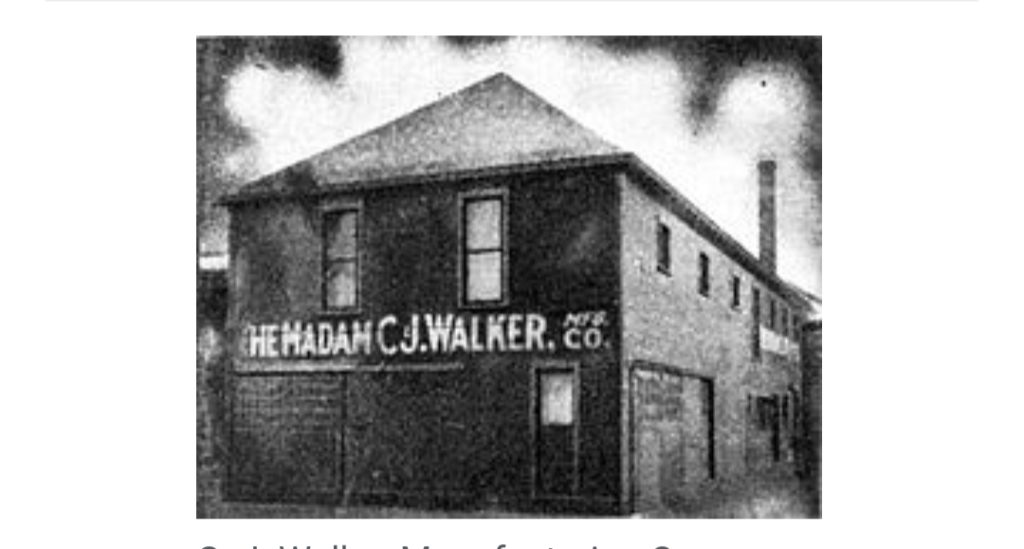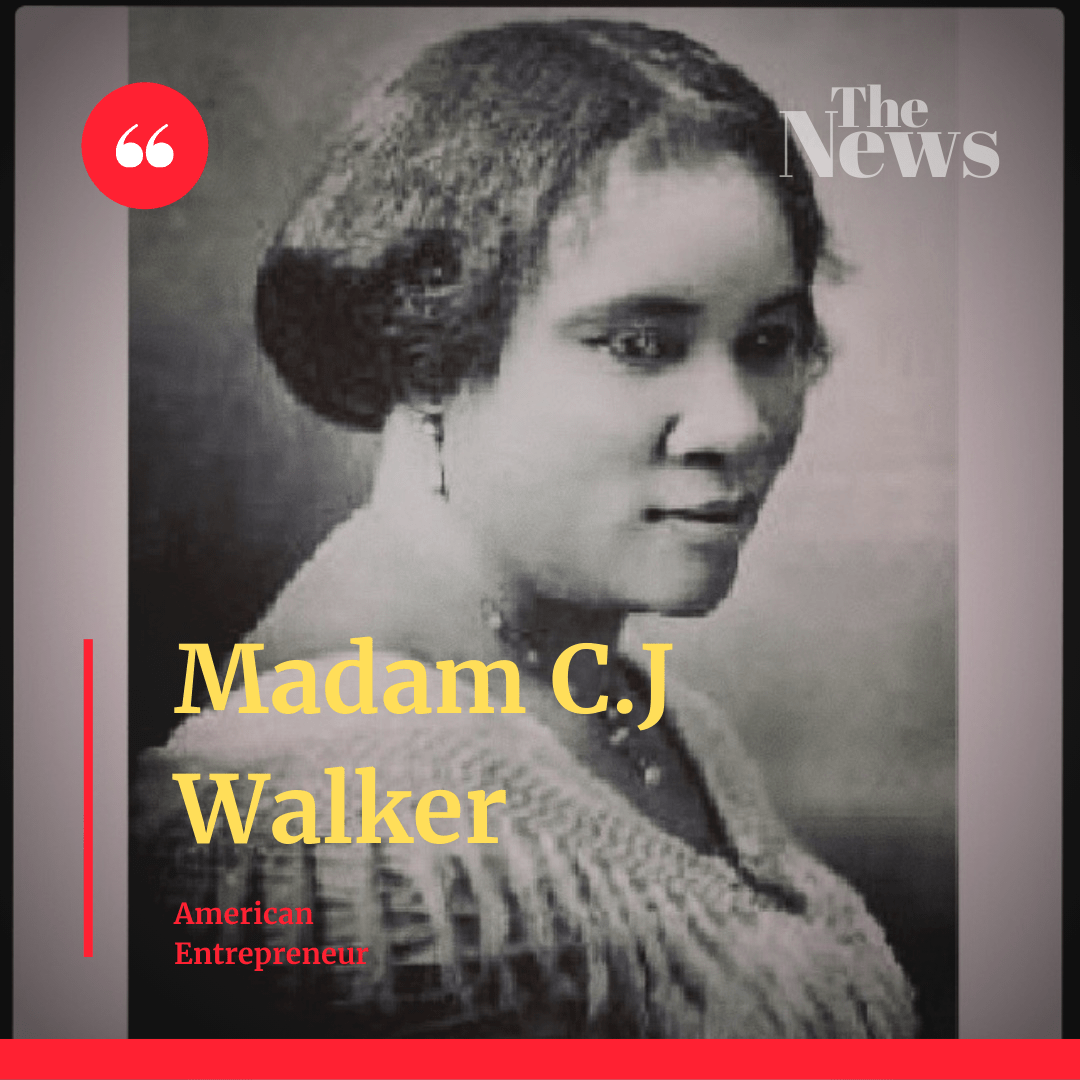How Madam C.J walker moved from nothing to the wealthiest African-American woman in America
Whos Madam C.J Walker?
Madam C.J Walker which her birth name was Sarah Breedlove was born December 23, 1867 and died May, 25 1919. She was an American entrepreneur, philanthropist, and political and social activist. She is recorded as the first female self-made millionaire in America. Shes the founder of the Madam C.J Walker Manufacturing Company

Madam C.J Walker’s early life
Sarah Breedlove was born close to Delta, Louisiana, to Owen and Minerva (Anderson) Breedlove. She was one of six children, and 5th child who included an older sister, Louvenia, and four brothers. Her older siblings were enslaved by Robert W. Burney on his Madison Parish plantation. Sarah was the first child in her family born into freedom after the Emancipation Proclamation was signed. Her mother died in 1872, likely from an unknown illness and her father died a year later.
Orphaned at the age of seven, Sarah moved to Vicksburg, Mississippi, at the age of 10, where she lived with Louvenia and brother-in-law, Jesse Powell. She started working as a child as a domestic servant.
Madam C.J Walker Marriage
In 1882, at the age of 14, Sarah married Moses McWilliams to escape abuse from her brother-in-law, Jesse Powell. Sarah and Moses had one daughter, A’Lelia, born on June 6, 1885. When Moses died in 1887, Sarah was twenty and A’Lelia was two.Sarah remarried in 1894, but left her second husband, John Davis, around 1903
In January 1906, Sarah married Charles Joseph Walker, a newspaper advertising salesman. Through this marriage, she became known as Madam C. J. Walker. The couple divorced in 1912; Charles died in 1926. A’Lelia McWilliams adopted her stepfather’s surname and became known as A’Lelia Walker.

How she started her hair business
In 1888, Madam C. J. Walker and her daughter moved to St. Louis, where three of her brothers lived. Sarah found work as a laundress, earning barely more than a dollar a day. She was determined to make enough money to provide her daughter with formal education.
As was common among black women then, Sarah suffered severe dandruff and other scalp ailments, including baldness, due to skin disorders, and the application of harsh products to cleanse hair. Other contributing factors to her hair loss included poor diet, illnesses, and infrequent bathing and hair washing during a time when most Americans lacked indoor plumbing, central heating, and electricity.
She served a commission agent selling products for Annie Malone, an African-American hair-care entrepreneur, millionaire, and owner of the Poro Company. Sales at the exposition were a disappointment since the African-American community was largely ignored.
While working for Malone Sarah began to take her new knowledge and develop her own product line. In July 1905, when she was 37 years old, Sarah and her daughter moved to Denver, Colorado, where she continued to sell products for Malone and develop her own hair-care business. A controversy developed between Annie Malone and Sarah because Malone accused Sarah of stealing her formula, a mixture of petroleum jelly and sulfur that had been in use for a hundred years.

Madam C.J walker career life
Following her marriage to Charles Walker in 1906, Sarah became known as Madam C. J. Walker. She marketed herself as an independent hairdresser and retailer of cosmetic creams. Her husband, who was also her business partner, provided advice on advertising and promotion; Sarah sold her products door to door, teaching other black women how to groom and style their hair. In 1906, Walker put her daughter in charge In 1906, Walker put her daughter in charge of the mail-order operation in Denver while she and her husband traveled throughout the southern and eastern United States to expand the business.
In 1908, Walker and her husband relocated to Pittsburgh, Pennsylvania, where they opened a beauty parlor and established Lelia College to train “hair culturists.” As an advocate of black women’s economic independence, she opened training programs in the “Walker System” for her national network of licensed sales agents who earned healthy commissions.

In 1910, Walker relocated her businesses to Indianapolis, where she established the headquarters for the Madam C. J. Walker Manufacturing Company. She initially purchased a house and factory at 640 North West Street. Walker later built a factory, hair salon, and beauty school to train her exchange agents, and added a laboratory to help with research.
Walker’s method of grooming was designed to promote hair growth and to condition the scalp through the use of her products. The system included a shampoo, a pomade stated to help hair grow, strenuous brushing, and applying iron combs to hair; the method claimed to make lackluster and brittle hair become soft and luxuriant.

By 1917, the company claimed to have trained nearly 20,000 women. Dressed in a characteristic uniform of white shirts and black skirts and carrying black satchels, they visited houses around the United States and in the Caribbean offering Walker’s hair pomade and other products packagedn tin containers carrying her image
Walker’s name became even more widely known by the 1920s, after her death, as her company’s business market expanded beyond the United States to Cuba, Jamaica, Haiti, Panama, and Costa Rica.

Madam C.J Walker Activism
She helped raise funds to establish a branch of YMCA in Indianapolis’s black community, pledging $1,000 to the building fund for Senate Avenue YMCA. Walker also contributed scholarship funds to the Tuskegee Institute. Other beneficiaries included Indianapolis’s Flanner House and Bethel African Methodist Episcopal Church; Mary McLeod Bethune’s Daytona Education and Industrial School for Negro Girls (which later became Bethune-Cookman University) in Daytona Beach, Florida; the Palmer Memorial Institute in North Carolina; and the Haines Normal and Industrial Institute in Georgia.
Madam C.J walker death
Walker died on May 25, 1919, from kidney failure and complications of hypertension, at the age of 51. Walker’s remains are interred in Woodlawn Cemetery in the Bronx, New York City.
At the time of her death, Walker was considered to be worth between a half million and a million dollars. She was the wealthiest African-American woman in America.
- Comedian Dave Chappelle tests positive for coronavirus cancels shows - January 28, 2021
- Boeing declares $12billion loss for 2020 - January 28, 2021
- American singer Halsey reveals she is pregnant with 1st child - January 28, 2021








